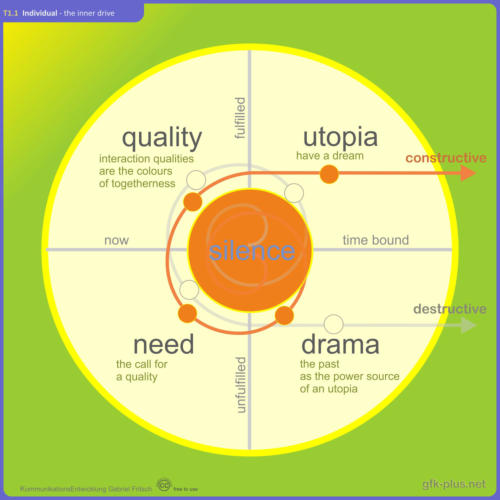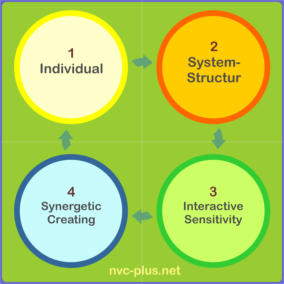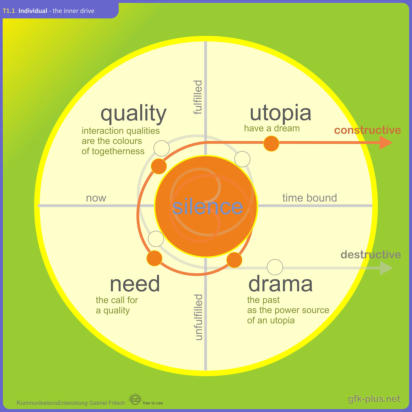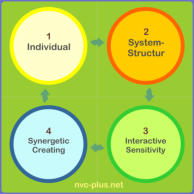
NVC-plus Elements: Utopias
Self-control
means
that
people
control
from
their
self.
If
we
ask
someone
random
about
politics,
environmental
protection
or
technology,
such
as
self-driving
cars,
we
will
hear
one
opinion.
If
we
ask
many
people,
we
will
hear
not
many
but
a
few
opinions,
some
of
which
are
very
similar.
We
tend
to
assemble
a
kind
of
pachwork
opinion
from
information
and
the
thoughts
of
others,
which
bears
a
strong
resemblance
to
the
opinions
of
quite
a
few
others
who
do
the
same.
So
we
seem
to
be
more
opinion
leaders
than
opinion
formers.
Thus
opinions
are
unsuitable
as
a
central element for self-control, because they have too little to do with oneself.
Experienced
dramas
are
also
ruled
out.
They
are
indeed
individual
and
also
carry
a
certain
part
of
our
aliveness,
but
unfortunately
they
are
directed
into
the
past
and
are
by
their
nature
more
concerned
with
avoiding
destruction
than
with
construction.
So
one
person's
dramas
are
not
a
good
networking
point
for
the others, who have their own dramas.
In
classical
Nonviolent
Communication,
one
works
with
needs.
These
are
very
similarly
present
in
all
people
worldwide
and
are
well
understood.
They
call
us
to
life
movements.
But
they
do
not
carry
any
further
design
logic,
which
is
why
in
classical
NVC
one
always
has
to
add
them
with
a
current
and
feasible
request.
With
this
one
can
clarify
individual
problems
very
well,
but
it
is
difficult
to
imagine
to
organize
a
system
with
this
communicative
effort.
So
we
need
future-oriented
life
forces
that
carry
a
comprehensible
design
idea.
This
is
how
we
came
up
with
what
we
call
a
person's
utopias.
You
can
also
call
it
dreams,
individual
visions
and
the
like, but the term utopia gave us the most pleasure.
Additional Card T1.1
NVC-plus
has
some
toolcards
that
are
numbered.
Toolcard
1.1
is
the
first
toolcard
for
the
first
field
of
the
four-step
circle
(small
card
on
the
right).
It
is
about
freeing
the
life
forces
that
are
stuck
in
dramas,
needs
and
qualities.
As
utopias,
the
life
forces
can
unfold
their
creativity
and
creative
power
and
are
available
for
the
common
processes.
An
example:
the
partner
says,
"Never
go
to
the
movies
with
me!"
Her
energy
comes
from
drama.
Then
she
thinks
about
the
needs
that
are
stuck
in
the
drama:
"I'm
all
about
more
connection,
fun
and
togetherness.
I've
been
missing
those
more
and
more
lately!
-
Her
energy
comes
from
the
need.
She
moves
to
the
next
circle
segment
of
the
tool
card,
"I'm
all
happy
and
joyful
thinking
about
how
we
have
more
togetherness,
connection,
and
fun."
Now
her
energy
comes
from
the
qualities
of
togetherness,
connection,
and
playing
together.
But
the
partner
doesn't
know
what
to
do
just
hearing
that
sentence.
Will
he
make
suggestions,
develop
guilt,
or
both?
And
where
is
her
creativity?
She
can
come
to
the
last
circle
segment
of
the
tool
card
and
say:
"Just
now
I
realize
that
I
have
a
utopia
for
our
evening
program:
Movie
and
then
a
leisurely
dinner."
Now
he
can
name
his
utopia
and
then
you
intertwine
the
two
utopias into a common vision.
Of
course,
this
is
not
the
perfect
example
because
it
only
concerns
the
organization
of
a
short
moment.
One
will
therefore
also
develop
a
weekly,
monthly,
annual
or
lifetime
utopia.
One
can
work
with
project
utopias,
corporate
utopias
or
solution
utopias
for
problems.
So
many
things
are
conceivable
and
one
should
not
pay
too
much
attention to utopias that are too big, because they are not always more important than the small ones.




The map is part of a map set that you can find in the book, in the app or in the downloads.






Organising projects with self-organised teams

Der Utopie-Zauberkreis
The
Utopia
Magic
Circle
is
an
NVC-plus
element,
so
it's
a
small
tool
that
you
can
use
very
well
without
NVC-
plus.
With
this
tool
you
open
a
utopian
space
in
you
and
you
in
your
team.
For
NVC-plus
it
is
essential
that
people
are
on
their
own
life
track
and
act
out
of
their
utopian
power.
But
how
do
you
find
your
utopia
if
you
are
not
inspired
at
all?
How
do
you
find
to
your
natural
inner
knowledge,
which
every
being
involved
in
the
creation
possesses
out
of
this
involvement?
In
any
case
not
by
thinking
too
much.
Try
it
sometime
with
the
utopia
magic
circle.
Try
it
best
together
with
your
team,
if
you
want
to
guess
your
next
step.
Because
self-direction
starts
from the conscious self. And remember: Life is utopian in principle.


Self-control
means
that
people
control
from
their
self.
If
we
ask
someone
random
about
politics,
environmental
protection
or
technology,
such
as
self-driving
cars,
we
will
hear
one
opinion.
If
we
ask
many
people,
we
will
hear
not
many
but
a
few
opinions,
some
of
which
are
very
similar.
We
tend
to
assemble
a
kind
of
pachwork
opinion
from
information
and
the
thoughts
of
others,
which
bears
a
strong
resemblance
to
the
opinions
of
quite
a
few
others
who
do
the
same.
So
we
seem
to
be
more
opinion
leaders
than
opinion
formers.
Thus
opinions
are
unsuitable
as
a
central
element
for
self-control,
because they have too little to do with oneself.
Experienced
dramas
are
also
ruled
out.
They
are
indeed
individual
and
also
carry
a
certain
part
of
our
aliveness,
but
unfortunately
they
are
directed
into
the
past
and
are
by
their
nature
more
concerned
with
avoiding
destruction
than
with
construction.
So
one
person's
dramas
are
not
a
good
networking
point for the others, who have their own dramas.
In
classical
Nonviolent
Communication,
one
works
with
needs.
These
are
very
similarly
present
in
all
people
worldwide
and
are
well
understood.
They
call
us
to
life
movements.
But
they
do
not
carry
any
further
design
logic,
which
is
why
in
classical
NVC
one
always
has
to
add
them
with
a
current
and
feasible
request.
With
this
one
can
clarify
individual
problems
very
well,
but
it
is
difficult
to
imagine
to
organize
a
system
with
this
communicative
effort.
So
we
need
future-oriented
life
forces
that
carry
a
comprehensible
design
idea.
This
is
how
we
came
up
with
what
we
call
a
person's
utopias.
You
can
also
call
it
dreams,
individual
visions
and
the
like,
but the term utopia gave us the most pleasure.
NVC-plus
has
some
toolcards
that
are
numbered.
Toolcard
1.1
is
the
first
toolcard
for
the
first
field
of
the
four-step
circle
(small
card
on
the
right).
It
is
about
freeing
the
life
forces
that
are
stuck
in
dramas,
needs
and
qualities.
As
utopias,
the
life
forces
can
unfold
their
creativity
and
creative
power
and
are
available
for
the
common
processes.
An
example:
the
partner
says,
"Never
go
to
the
movies
with
me!"
Her
energy
comes
from
drama.
Then
she
thinks
about
the
needs
that
are
stuck
in
the
drama:
"I'm
all
about
more
connection,
fun
and
togetherness.
I've
been
missing
those
more
and
more
lately!
-
Her
energy
comes
from
the
need.
She
moves
to
the
next
circle
segment
of
the
tool
card,
"I'm
all
happy
and
joyful
thinking
about
how
we
have
more
togetherness,
connection,
and
fun."
Now
her
energy
comes
from
the
qualities
of
togetherness,
connection,
and
playing
together.
But
the
partner
doesn't
know
what
to
do
just
hearing
that
sentence.
Will
he
make
suggestions,
develop
guilt,
or
both?
And
where
is
her
creativity?
She
can
come
to
the
last
circle
segment
of
the
tool
card
and
say:
"Just
now
I
realize
that
I
have
a
utopia
for
our
evening
program:
Movie
and
then
a
leisurely
dinner."
Now
he
can
name
his
utopia
and
then
you
intertwine the two utopias into a common vision.
Of
course,
this
is
not
the
perfect
example
because
it
only
concerns
the
organization
of
a
short
moment.
One
will
therefore
also
develop
a
weekly,
monthly,
annual
or
lifetime
utopia.
One
can
work
with
project
utopias,
corporate
utopias
or
solution
utopias
for
problems.
So
many
things
are
conceivable
and
one
should
not
pay
too
much
attention
to
utopias
that
are
too
big,
because
they
are
not
always
more
important than the small ones.


The
map
is
part
of
a
map
set
that
you
can
find
in
the book, in the app or in the downloads.




NVC-plus Elements: Utopias
Additional Card T1.1
Utopia Magic Circle




Organising projects with self-organised teams

For
NVC-plus
it
is
essential
that
people
act
out
of
their
utopian
power.
But
how
do
you
find
to
your
utopia
if
you
are
not
inspired
at
all?
How
do
you
find
to
your
natural
inner
knowledge,
which
every
being
involved
in
the
creation
possesses
out
of
this
involvement?
In
any
case
not
by
thinking
too
much.
Try
it
sometime
with
the
utopia
magic
circle.
Try
it
best
together
with
your
team,
if
you
want
to
guess
your
next
step.
Because
self-direction
starts
from
the
conscious
self.
And
remember:
Life
is
utopian
in
principle!

























